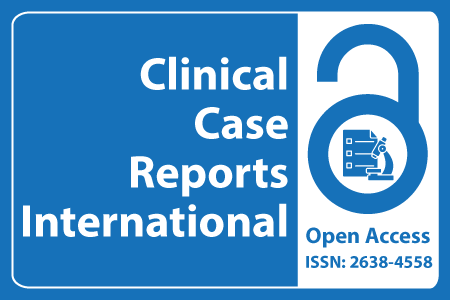
Journal Basic Info
- Impact Factor: 0.285**
- H-Index: 6
- ISSN: 2638-4558
- DOI: 10.25107/2638-4558
Major Scope
- Chronic Disease
- Hepatology
- Hepatitis
- Autism
- Traumatology
- Leukemia
- Sleep Medicine and Disorders
- Pulmonary Medicine
Abstract
Citation: Clin Case Rep Int. 2023;7(1):1627.DOI: 10.25107/2638-4558.1627
Takotsubo Cardiomyopathy Complicated by Ischemic Stroke: Cause or Consequence?
Charfo M, Mulendele P, Njie M, Haboub M and Habbal R
Department of Cardiology, University Hospital Center Ibn Rochd - Casablanca, Morocco
PDF Full Text Case Report | Open Access
Abstract:
Introduction: Takotsubo Syndrome (TTS) or broken heart syndrome is a cardiomyopathy belonging to unclassifiable acquired cardiomyopathies according to the 2008 European Society of Cardiology classification. The syndrome is characterized by acute, transient, and reversible left ventricle systolic dysfunction. The etiology remains unclear, with direct or indirect catecholamine cardiotoxicity as the principal mechanism. This condition, which mimics acute coronary syndrome, mainly affects elderly, post-menopausal women following emotional or physical stress such as an acute stroke. Case Report: Here, we describe a case of TTS in an 80-year-old hypertensive woman who presented with regressive left hemiparesis at a funeral. Evaluation on admission revealed precordium T-wave inversion with elevated troponins and apical hypokinesia on echocardiography. Coronary angiography with ventriculography and cardiac MRI ruled out acute coronary syndrome, and the diagnosis of Takotsubo Cardiomyopathy (TC) associated with right sylvian stroke was retained. The course was favorable, with systolic function recovery under medical treatment with beta-blockers and converting enzyme inhibitors. Conclusion: A disorder of the elderly woman, TTS occurs in the aftermath of stress such as cerebral ischemia. However, when neurological disease and takotsubo syndrome occur concomitantly, it is difficult to distinguish whether ischemia is the causative factor or the consequence.
Keywords:
Acute; Cardiomyopathy; Systolic dysfunction; Postmenopausal woman; Reversible; Transient; Cerebral ischemia; Stress; Takotsubo
Cite the Article:
Charfo M, Mulendele P, Njie M, Haboub M, Habbal R. Takotsubo Cardiomyopathy Complicated by Ischemic Stroke: Cause or Consequence?. Clin Case Rep Int. 2023; 7: 1627.













